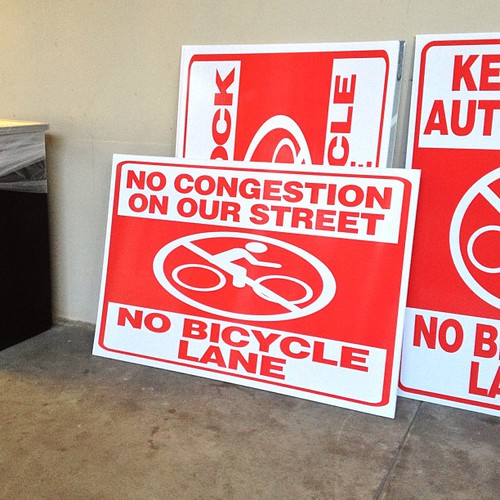
Photo credit: vision63
In just about every major American metropolitan region, and especially here in the Bay Area, streets are congested – and contested – spaces. Increasingly cities are reallocating mixed-traffic lanes to accommodate bicycling, and while this makes it safer for the cyclists, it can affect the traffic flow by reducing the number of lanes available for motorists, transit, and goods movement. Encouraging more cycling through the creation of dedicated bicycle infrastructure may be a wise investment in the long-term, but the short-term pains it causes some commuters has given rise to the use of phrases such as “anti-car” and “war on drivers.”

Do people on bikes cause or relieve congestion? Oftentimes changing streets to accommodate bicycling is as being a “bikes vs cars” issue. Photo credit: ubrayj02
In contemplating the growing tension over bike lane implementation in North American cities, city planner Bret Toderian contends that we should not lose sight of the greater societal aspiration behind changing our existing transportation system– to improve our cities. In an article on the Huffington Post, Toderian describes this approach to recent bike lane debates:
We need a more sophisticated discussion about how we get around in cities, and it starts with this — it’s not about loving your bike. It’s about loving what biking does for cities. If more cars make cities worse, the opposite is true for bikes. Expanding urban biking is about making better, fiscally smarter, healthier, more flexible and resilient cities. Bikes are hardly a silver bullet, but they can be a big part of better city-making.
Toderian proceeds to provide compelling arguments to support this position. He notes that encouraging cycling makes sense in cities because bicycles are more space efficient:
Most pragmatically, city-builders understand that bikes make cities work better because they take a lot less space. Even if cars were clean in emissions, the biggest challenge with car-dependency is a space problem. There isn’t enough room on the roads and parking lots of cities, to have everyone drive. They just don’t fit, and our failed efforts to make them fit, cost a staggering amount.
Perhaps surprisingly, Toderian also argues that having more people cycle in a city actually makes driving easier, not more difficult:
Even if they [cities] prioritize driving, global city-builders recognize the best thing those who feel they need to drive could hope for, is for OTHER people to be able to walk, bike and ride transit. Multi-modal cities make it easier for EVERYONE to get around – including, counter-intuitively, drivers.
When viewed through this lens it does become apparent that existing traffic congestion cannot be solved by only accommodating one mode of transportation and that bicycles are just one tool in the tool box of ways to make cities more pleasant and inhabitable– it isn’t about bikes versus cars. Check out Toderian’s full Huffington Post article.
